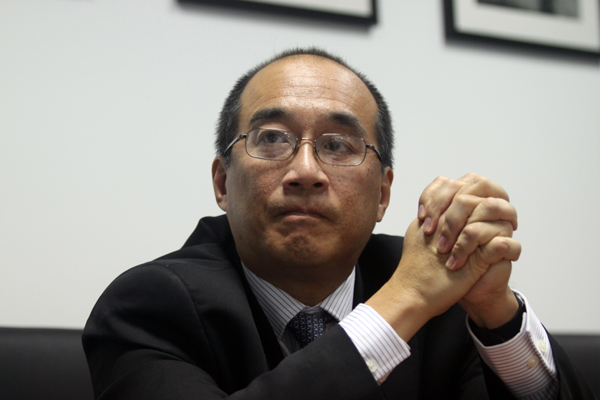
 |
|
Derek Han says having intense exposure to the more practical financial world gives him a deeper appreciation of music. Liu Zhe / China daily |
Unlike many business leaders, Derek Han is unlikely to get nervous speaking in public or appearing on television.
The 54-year-old Chinese-American chairman of North Square Blue Oak has another life - he is an international concert pianist who has played at the world's greatest venues and given private performances to three US presidents.
"I was with a colleague the other week about to appear on Bloomberg and she asked me whether I was nervous. I said: 'When you have walked out in front of more than 2,000 people at the Carnegie Hall, you can face almost anything'."
His office in Beijing in the Nanxincang Business Tower at Dongsi Shitiao is certainly a slightly more cramped stage than that of the Carnegie.
It is one of the bases - the other being in London - of NSBO, the global institutional securities firm. It provides research to clients around the world and one of its key specializations is China.
Han, who graduated from The Juilliard School of Music in New York and won the Athens International Piano Competition in 1977, would have probably just been a musician, if he had not inherited $50 million in the late 1980s.
"I ended up with a barrel of cash that I had to start managing," he says.
NSBO now employs about 40 in London and 10 in Beijing and carries out research for a number of institutional clients, hedge funds and those involved in private equity.
Han divides his time between the US state of Florida, where he owns a home; London, where he mainly stays in hotels; and Beijing.
When he is on business, he makes time to practice the piano "for at least two or three hours", he says. "Playing the piano requires physical dexterity."
"If a professional basketball player doesn't warm up before going to play a game, he will probably get injured. You also need to keep your hands in shape."
His keyboard favorites? Piano Concerto No 2 by Sergei Rachmaninov and the dagio (second movement) of Piano Concerto No 5 "Emperor" by Ludwig van Beethoven. ("One of music's sublime moments that has a total sense of inner peace," he says of the "Emperor".)
Like many, Han is pre-occupied with the euro crisis and its ongoing impact on the rest of the world. "I think China is the only large economy that will be able to come out from an economic perspective in good shape," he says.
"We are still seeing a huge migration from rural China. I think that is going to be sufficient to maintain growth here."
Han's parents left China in the 1940s but only met in the United States on a PhD program at Ohio State University.
Brought up in Columbus, he learned to speak the Shanghai dialect at home.
"It was what my parents spoke at home, when they didn't want us kids to know what they were saying," he says.
Music remains a major driving force in his life. He tours extensively and has recorded all the Mozart, Haydn and Beethoven concertos.
"I started when I was 7 and literally practiced seven or eight hours a day. There is this fallacy that someone can do this because they are exceptionally talented. You can be as talented as you want but you really have to work at it. You have to put the miles on the keyboard," he says.
Darnell Gardner Jr. contributed to this story.